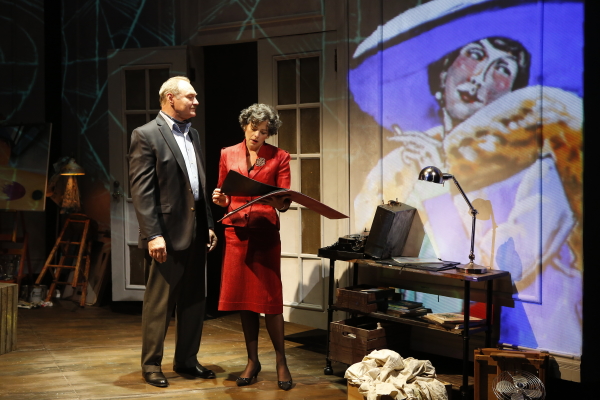Bauer
Lauren Gunderson theatricalizes the story of German painter Rudolf Bauer and the inauspicious end of his career at 59E59 Theaters.

(© Carol Rosegg)
"Order and disorder. That's all we have."
Lauren Gunderson opens the earnest floodgates of Bauer, her tribute to the tortured 20th-century German painter Rudolf Bauer, with a subtle nod to Stephen Sondheim's fellow-canvas-inspired Sunday in the Park With George. A pioneer in the field of "non-objective" (i.e. abstract) art, Gunderson's work of historical fiction tackles the complex emotions and motivations behind Bauer's disappearance from the art scene in the early 1940s. Fluctuating between a sleepy living-room drama and an incongruously avant-garde display, Gunderson lands on a few genuinely intriguing moments — though to find them you have to weed through these alternating spurts of lifeless order and overwhelming disorder.
We meet our title character (a stoney Sherman Howard) upon his dramatically morose entrance into the artist's long-abandoned studio. Filled with dusty crates and a tarp-covered aisle, director and designer Bill English has created a sparse environment, appropriately absent of any creative life. Micah J. Stieglitz's projections, consequently, become all the more captivating as they periodically transport Bauer back to his days of inspiration. While the reasons for his artistic dry spell remain unclear for a painstakingly extended portion of the play, the opening scene between the ex-painter and his wife (and former maid) Louise (played with a nurturing, though slightly flimsy hand by Susi Damilano) suggests that their impending visitor is at the core of the issue.
Enter Hilla Rebay — abstract artist and original Guggenheim museum director (commandingly portrayed by Stacy Ross), with whom Bauer historically shared a sordid romantic and professional past. After an extended exchange of clever quips and aggressive digs, we learn that Rebay, once one of Bauer's most devoted advocates, is the reason the painter found himself locked in an unfair contract with Solomon R. Guggenheim: the cause of his sudden (and potentially spiteful) early retirement. As more and more details ever-so-slowly trickle out of their contentious conversation, the play transforms into an artistic intervention, hosted by our two leading ladies, in an effort to spark Bauer's dormant creative juices.
After a melodramatic start, English's direction begins to settle into a more comfortable rhythm, with the humor and tension in Gunderson's dialogue finding a sincere voice in her trio of actors. The lumbering pace of the story becomes the play's greatest hindrance, as the plot primarily consists of Bauer and Rebay's emotional reminiscences rather than an unfolding narrative. Gunderson, however, does indulge us in an engrossing history lesson about Bauer's complicated relationship with Rebay, his connection to the famous Guggenheim Museum, and his time spent as a Nazi prisoner during the party's witch hunt for "degenerate" artists. Howard and Ross manage to draw us in as well with their sharp rapport, even as the story grinds along at a snail's pace. Ross in particular stands out at the play's most captivating presence, tapping into the sympathetic character beneath Rebay's domineering, manipulative exterior.
Yet as the topic of conversation shifts from the details of Bauer's past to projections for his artistic future (his deteriorating health likely making it a short future), Gunderson's imagination takes one too many liberties with the historical foundation she spends most of the play building. While the peculiar twist she adds gives the piece a much-needed shot in the arm, the emotionally bursting resolution to which it rapidly leads us is far too jarring to be reconciled with the previous hour of grounded dialogue. Though Gunderson finally affords Bauer his long-awaited moment of catharsis, the sensationalized set of sounds and images English has curated for the play's final moments will unfortunately leave more people scratching their heads than clutching their hearts.








